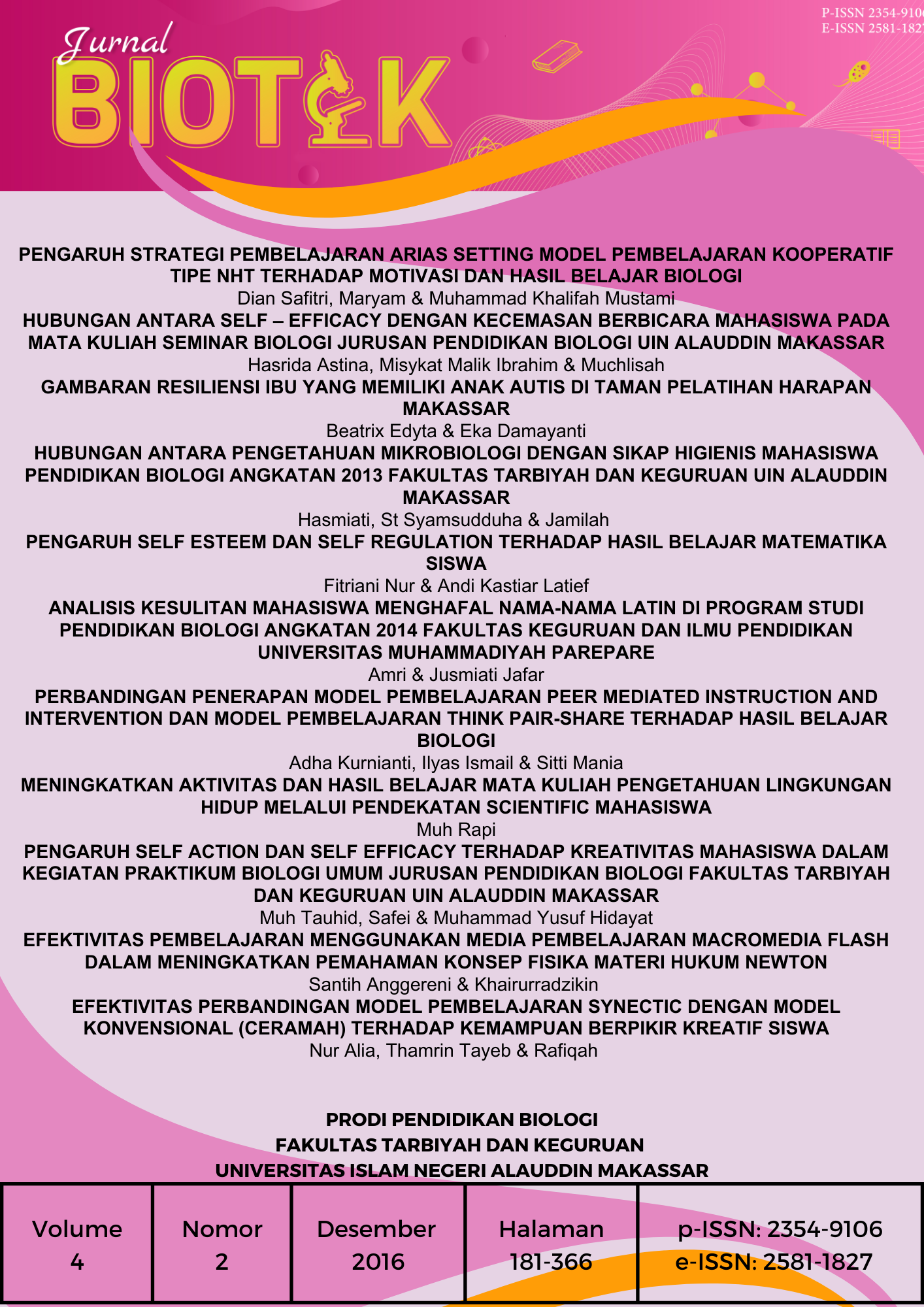GAMBARAN RESILIENSI IBU YANG MEMILIKI ANAK AUTIS DI TAMAN PELATIHAN HARAPAN MAKASSAR
Abstract
This research is a qualitative research that aims to reveal the resilience of mothers of children with autism. Resilience in this study is understood as a capability that is owned by a mother to rise from unpleasant conditions and survive in the face of life's difficulties. Subjects in this study were three mothers in the Taman Pelatihan Harapan youngest child who has autism. Data collected by observation and interview.
The results showed that all three subjects experienced different dynamics in each aspect of resilience (emotional control, impulse control, optimistic, analysis of the causes of the problem, empathy, self-efficacy, and increase the positive aspects). Three subjects were surprised, slumped, and did not think their child will have autism disorders. But they are able to accept the conditions and able to bounce back and always think positive future their children will be better. They feel confident to provide the best for his son while trying to figure out and improve their skills in dealing with children, as well as involved in the therapeutic process. Of the three subjects, one of which is able to analyze the causes of the disorder owned so he did not turn himself and others for any inconvenience experienced by children. In addition, one of the factors that support individuals to become resilient is a factor of religiosity. This is shown by the three subjects that always surrender to Allah SWT and gratitude that can make them rise from adversity.
Downloads
References
Dewi, I. R., Vonny, & Melisa. (2004). “Hubungan Antara Resiliensi Dengan Depresi Pada Perempuan Pasca Pengangkatan Payudara”. Jurnal Psikologi, Volume 2, Nomor 2.
Desmita. (2007). Psikologi Perkembangan. Bandung: PT Remaja Rosdakarya.
Hartuti & Mangunsong, F. M. (2009). “Pengaruh Faktor-Faktor Protektif Internal dan Eksternal Pada Resiliensi Akademis Siswa Penerima Bantuan Khusus Murid Miskin (BKMM) Di SMA Negeri Di Depok”. Jurnal Psikologi Indonesia, Volume 6, Nomor 2.
Hasdianah. (2013). Autis Pada Anak. Yogyakarta: Nuha Medika.
Mumun, S. (2010). “Dinamika Resiliensi Orang Tua Anak Autis”. Jurnal Psikologi,Volume 2, Nomor 1.
Nevid, J. (2003). Psikologi Abnormal. Jakarta: PT Erlangga.
Razak, I. (2012). “Religiusitas Dan Resiliensi Pada Remaja Narapidana”. Skripsi, Universitas Negeri Makassar: Tidak diterbitkan.
Sari, Y, Mardiawan, & Prakoso. 2010. “Program Peningkatan Resilience pada Ibu yang Memiliki anak Autis di Bandung”. Skripsi. Universitas Islam Bandung: Tidak diterbitkan.
Williams & Wright. (2007). Strategi Praktis Bagi Orang Tua dan Guru Anak Autis. Jakarta: Dian Rakyat.
Widuri, E. L. (2012). “Regulasi Emosi dan Resiliensi Pada Mahasiswa Tahun Pertama”. Jurnal Humanitas, Volume 9 Nomor 2.
Authors who publish with Jurnal Biotek agree to the following terms: Authors retain the copyright and grant Universitas Islam Negeri Alauddin Makassar right of first publication with the work simultaneously licensed under a Creative Commons Attribution License (CC BY-SA 4.0) that allows others to share (copy and redistribute the material in any medium or format) and adapt (remix, transform, and build upon the material) the work for any purpose, even commercially with an acknowledgement of the work's authorship and initial publication in Universitas Islam Negeri Alauddin Makassar. Authors are able to enter into separate, additional contractual arrangements for the non-exclusive distribution of the journal's published version of the work (e.g., post it to an institutional repository or publish it in a book), with an acknowledgement of its initial publication in Universitas Islam Negeri Alauddin Makassar. Authors are permitted and encouraged to post their work online (e.g., in institutional repositories or on their website) prior to and during the submission process, as it can lead to productive exchanges, as well as earlier and greater citation of published work (See The Effect of Open Access).

This work is licensed under a Creative Commons Attribution-ShareAlike 4.0 International License.



